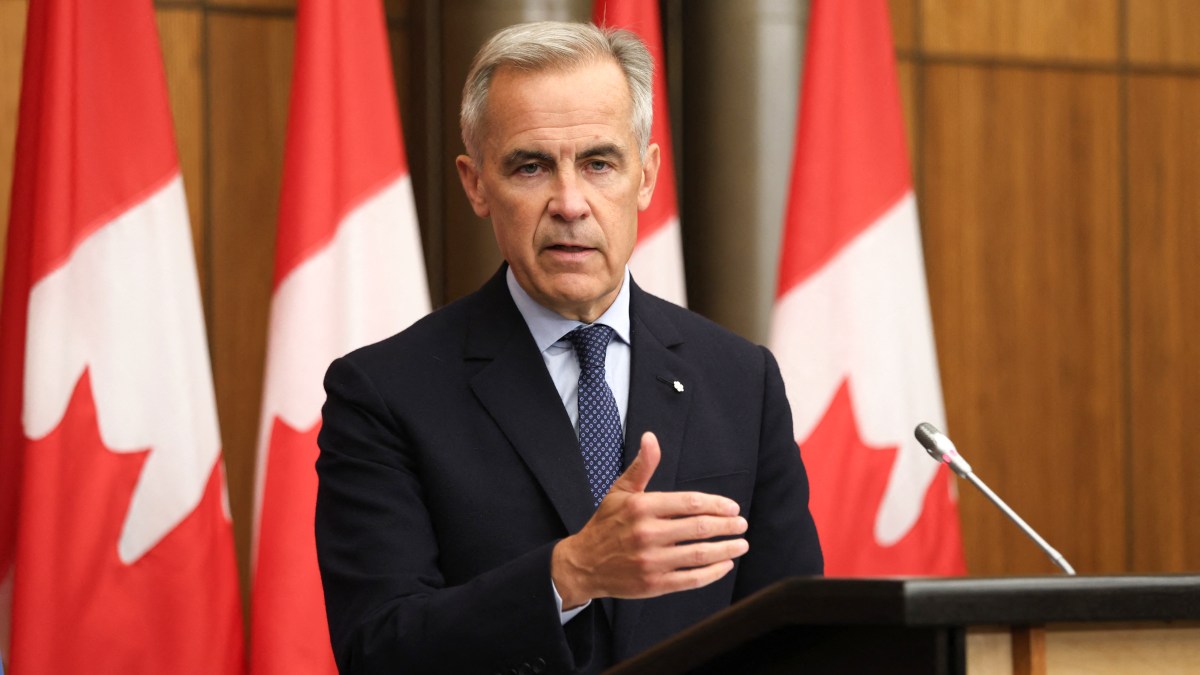Canada has now joined France and Britain in saying it intends to recognise the state of Palestine at the United Nations general assembly in September.
If a week is a long time in politics, then a month is even longer in the Middle East, and what Israel, the West Bank and Gaza will look like by then is an open question.
France has decided to ignore all that, and make its recognition unconditional — at least in theory.

President Macron with the Palestinian president in the West Bank city of Ramallah in January 2020
LUDOVIC MARIN/AFP/GETTY IMAGES
President Macron’s statement said: “True to its historic commitment to a just and lasting peace in the Middle East, I have decided that France will recognise the state of Palestine.
“We must also guarantee the demilitarisation of Hamas, and secure and rebuild Gaza.”
In other words, although he is — like most western states — demanding the disarming of Hamas and its removal as the governing force in Gaza, he would recognise Palestine anyway. He would argue that recognising Palestine in practice means recognising Hamas’s rival, the Palestinian Authority, as its government, so this would not be “rewarding Hamas”.
Britain tried a different tack, in keeping with Sir Keir Starmer’s constant attempts to forge a middle way between his backbenchers and his desire to keep good relations with the pro-Israel Trump administration.
• Palestine pledge could break the law, top lawyers warn Starmer
David Lammy, the foreign secretary, in a statement to the UN conference on the two-state solution, used similarly grandiose terms to Macron’s.
He said: “It is with the hand of history on our shoulders that His Majesty’s government therefore intends to recognise the state of Palestine when the UN general assembly gathers in September here in New York.”
But unlike Macron, he gave Israel, which is deeply hostile to the idea, a way out. “We will do it unless the Israeli government acts to end the appalling situation in Gaza, ends its military campaign and commits to a long-term sustainable peace based on a two-state solution,” he said.

Israeli tanks assemble near destroyed buildings in Gaza earlier this year
JACK GUEZ/AFP/GETTY IMAGES
In his speech, Lammy also made “absolute and unwavering” demands on Hamas. “It must immediately release the hostages, agree to an immediate ceasefire, accept it will have no role in governing Gaza and commit to disarmament,” he said.
• What will happen to the West Bank if Palestine becomes a state?
But there was “no conditionality” attached and no statement that anything Hamas might do or not do would cause the British government to change its mind.

Protesters outside the UN in New York, where a conference on a two-state solution for Israel and Palestine took place on Tuesday
CHARLY TRIBALLEAU/AFP/GETTY IMAGES
The main criticism raised by pro-Israel critics is that this gives Hamas an incentive to stall any ceasefire deal, since only Israel will be punished if one is not agreed. Lammy said: “No one side will have a veto on recognition through their actions or inactions.” But only Israel would want to veto this development.
The critics are now demanding the government explicitly insert balancing conditions on the “other side”.
Mark Carney, the Canadian prime minister, appears to have hewed more to the British path. His statement said that Canada “intended” to recognise Palestine but also made the decision conditional.
His conditions, though, were aimed at the Palestinian Authority of President Abbas, rather than Israel.

Macron, Carney, Trump and Starmer pictured at the G7 summit in Canada in June
SUZANNE PLUNKETT/PA
He said: “This intention is predicated on the Palestinian Authority’s commitment to much-needed reforms, including the commitments by Palestinian Authority President Abbas to fundamentally reform its governance, to hold general elections in 2026 in which Hamas can play no part, and to demilitarise the Palestinian state.”
Many people have demanded reforms of the Palestinians — the West, the Gulf states, Palestinians themselves. Few have been forthcoming.
It is clear that both Britain and Canada have work yet to do. They have to form a view on whether the conditions they have set to recognise or not recognise Palestine have been met. Neither has described the process by which that decision will be made.
